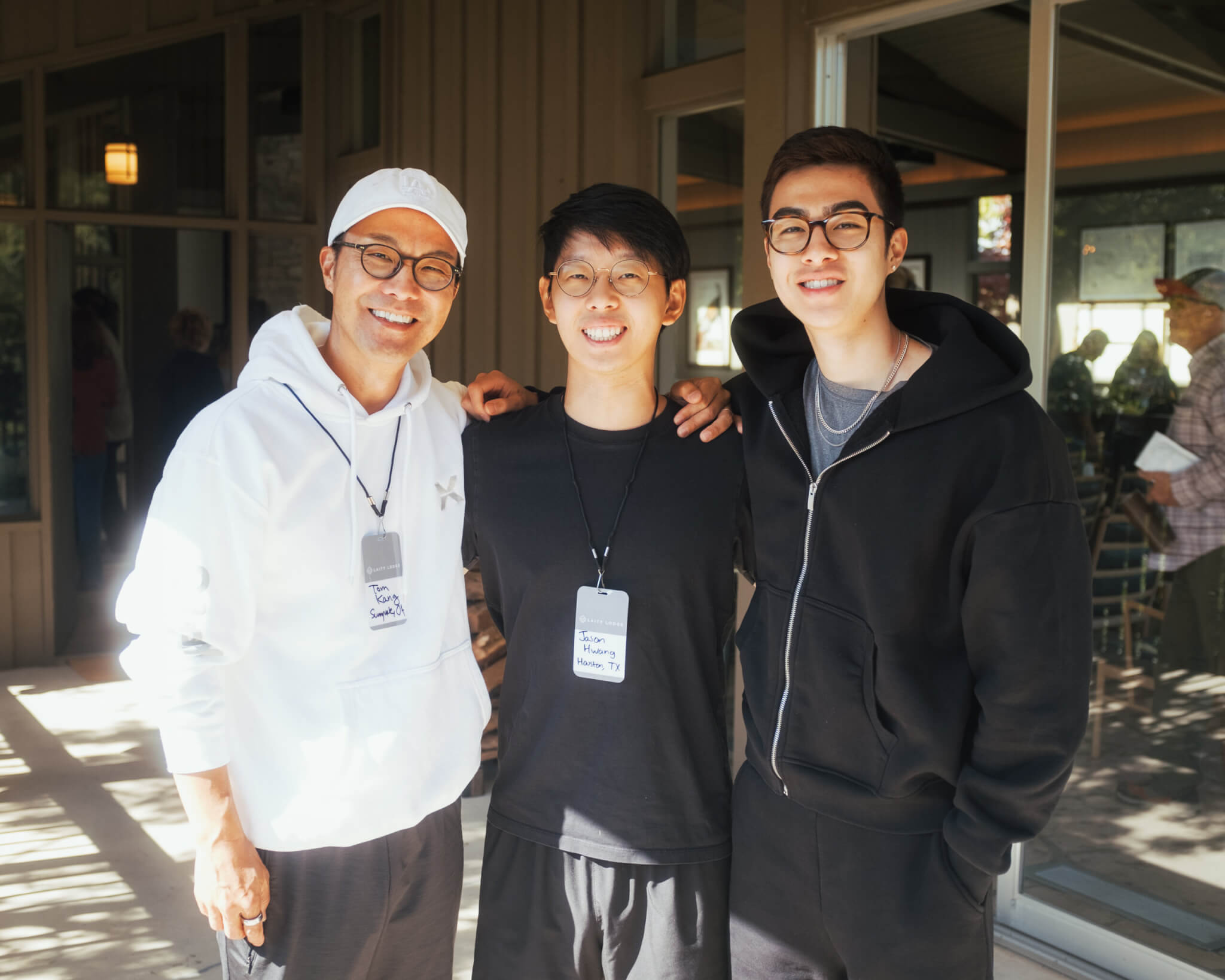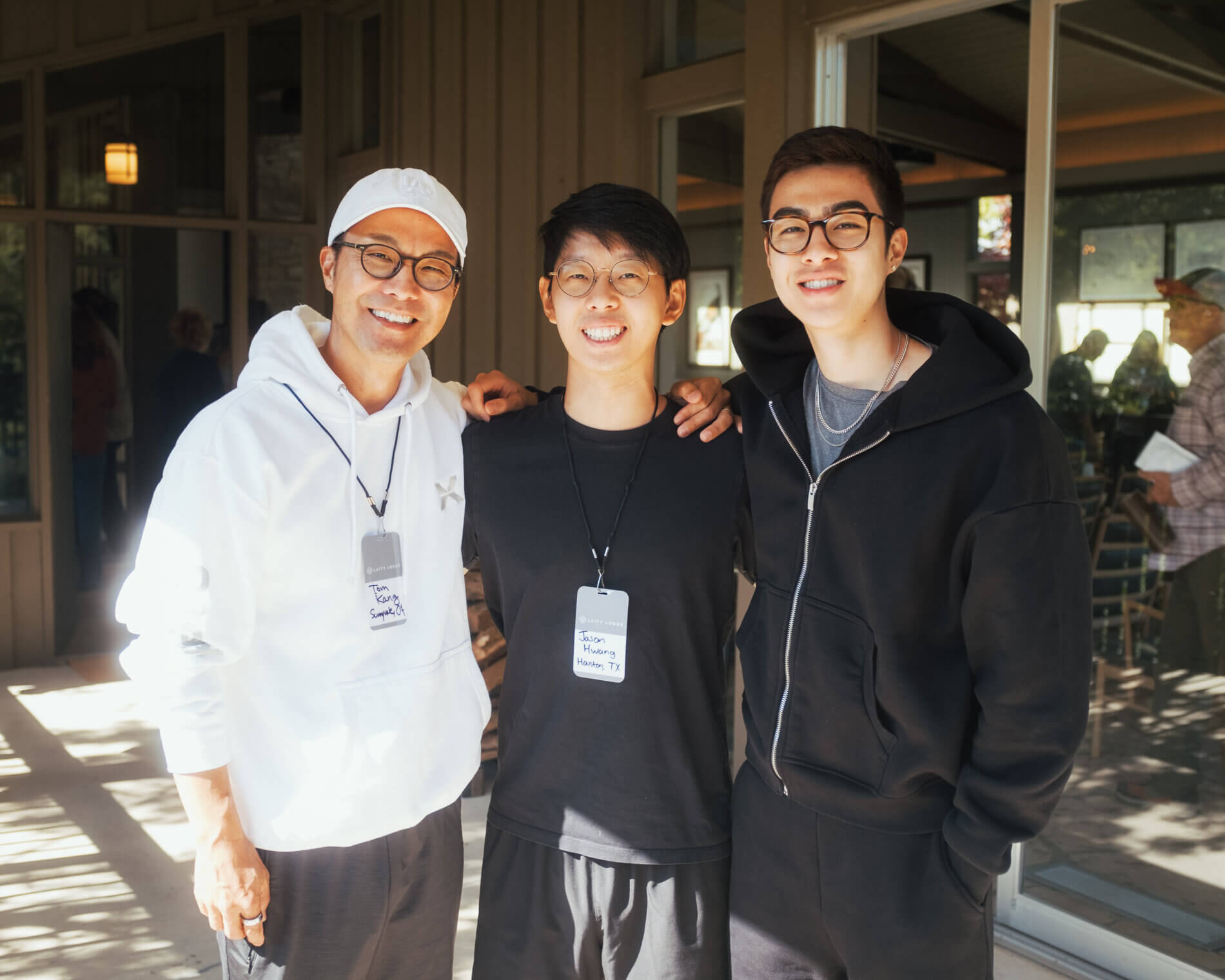
Words by Amy Crouch | Photos by Caleb Saenz

The Kang family discovered the antidote to generational hubris—just jump into the river.
Timothy Kang and his brother-in-law Jason are both in their twenties—but when they walked down the path to Laity Lodge for the first time, they felt like five-year-olds.
That’s what Timothy, a senior in college, told me about his family’s visit to Laity Lodge this fall. When he and Jason saw the room they’d be staying in, the Frio River filled with curious fish, and cliffs to hike up—and jump from—it was hard not to go back in time: “We had that restless child energy. We could all be kids again!”
Timothy and Jason had been “dragged” to a Laity Lodge retreat by Timothy’s father, Tom, who had visited the Lodge a year before his wife, Helen, in the middle of a substantial vocational transition.
For Tom, that first retreat had been a chance to step back. “I was seeking clarity in terms of beginning a new chapter,” he says. His day-to-day work is in finance and technology—work which quickly consumes all dimensions of life, from the physical to the spiritual. What he needed was a chance to step back and find clarity—”a chance to test, palpably, the presence of God.”
It wasn’t about finding career advice, exactly; it was almost the opposite.
“What I wanted to give to my boys,” he says, was “a place to be childlike and a place without judgment, where they could be embraced by God’s love.”
| “What I wanted to give to my boys was a place to be childlike and a place without judgment, where they could be embraced by God’s love.” —Tom Kang |
|---|
Day-to-day life, whether you’re a software engineer like Jason or a college student like Timothy, can often demand that you put up a kind of false front—making sure that people see you at your most competent and mature.
But when you’re safe, you get the rare chance to let your guard down—and, paradoxically, open yourself up to new and exciting risks. Tom told me that a Lodge weekend meant a kind of freedom: freedom to ask challenging theological questions, to have a deep conversation with a stranger, or to take a big jump into the river.
When I asked theologian Julie Canlis about this kind of childlike freedom, she emphasized that it characterizes the life that Jesus called for. “Jesus says, the older you get, the more childish you should be!” she shares, referencing Matthew 18:3. “There’s so much to a theology of play, but at its core is the belief that our Father is more childlike than we are.”
But Jesus’s kind of childlikeness is, surprisingly, something that can better equip us for the kinds of big decisions that Tom made about his career and that Jason and Timothy are trying to make in their twenties. “That is the essence of maturity,” says Canlis, “to grow into more and more trust and simplicity.”
The reality is that all adults, whether in their twenties or in their seventies, can become easily tempted to what Canlis calls “generational hubris”—the idea that you’ve left childhood behind and figured everything out.
Canlis says that there’s good news for all of us as long as we’re ready to accept that we don’t know it all. “When older people seek the wisdom of youth, they are actually becoming younger—because they are not taking themselves so seriously. When younger people seek the mentorship of age, they are becoming mature.”
| There is so much to a theology of play, but at its core is the belief that our Father is more childlike. —Julie Canlis |
|---|
Not every weekend at the Lodge is perfect. But at its best, our staff often sees these kinds of connections blossom: a singer-songwriter in her twenties and a dancer in her seventies laughing together over cookies and coffee, or a mother deciding to accept her daughter-in-law’s invitation to go for a midnight swim.
And this kind of childlike freedom with people of all ages can be rare. A guest in his thirties shared that he finds it difficult to connect across generations without a kind of transactional quality—a mentor/mentee relationship. And another guest noted that despite being very close with her family, “this kind of playtime isn’t part of the rhythm of our day-to-day life… At a retreat, we get to share that together.” The good meals, the long hikes, and quiet time may seem ordinary, but there’s something extraordinary going on.
Just a month before the Kangs were at Laity, during a retreat themed around “Living Beyond Loss,” Dr. Ellen Davis of Duke Divinity School told us about another family: the one featured in the Old Testament book of Ruth. The four chapters of Ruth tell us about a mother, Naomi and her daughter-in-law, Ruth, who suffer grievous loss, choose to love each other through it, and find astonishing grace on the other side.
Davis, who came to speak with members of her own family, described the book as the “still, small voice of the Old Testament.” The book of Ruth isn’t particularly spectacular: it is a story of ordinary people committing “to take a risk together and for each other.”
“Tragedy begins to be redeemed through the selfless actions that one person renders to another: a young widow to her mother-in-law,” said Davis. Two poor women travel to find food; one of them marries and has a baby. It won’t look significant to everyone—but it does to God.
Timothy Kang told me that his time at the Lodge “wasn’t always spiritually ‘deep’ or ‘productive.'” It was “just walking, eating, swimming” with his dad and his brother-in-law—not always big, impressive moments of spiritual enlightenment. But when this ordinary, extraordinary family gathered and became like little children, they heard “the still, small voice of God.”

One family models what it looks like to share the Canyon—and their faith journey—with the next generation.
Compass Rose Journey is helping its students and teachers to get off the couch and into the outdoors.
David Rogers announces the launch of a nonprofit to help San Antonio faith communities support mental wellness.